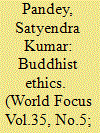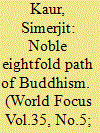|
|
|
Sort Order |
|
|
|
Items / Page
|
|
|
|
|
|
|
| Srl | Item |
| 1 |
ID:
130814


|
|
|
|
|
| Publication |
2014.
|
| Summary/Abstract |
Buddhist Ethics is imbedded in the fabric of Noble Eightfold Path which prescribes certain do's and don's in order to get rid of suffering and attain the highest goal of Eternal Bliss (Nirvana). Though, the basic purpose of Buddhism is to make the people aware of existential problem of suffering and to enable them to get rid of it, it has touched almost all aspect of human life. The formulation of Buddhist ethics in fom1 of moral code is one of them.
Ethics generally deals with human conduct and is concerned with questions pertain to what is good and bad, what is right and wrong, what is virtue and vice, what is just and unjust, what are our duties and rights. There are divergent views with regard to the scope and nature of ethics. Modern ethical philosophers belonging to the Analytic school of philosophy consider it their task merely to analyses and clayey the nature of ethical concepts or theories. For them, ethics constitutes a purely theoretical study of moral phenomena. They do not consider it their province to lay down codes of conduct, which they deem to be the function ofa moral teacher, a religious leader or a prophet.' However, some of the Existentialists philosophers consider it the duty of philosopher to recommend ways of life or modes of conduct which they consider desirable for the purpose of achieving some end which they regard as valuable. Kierkegaard, for instance, considers that there are three stages of life, namely, the aesthetical or sensualist, the ethical and the _religious. He indirectly recommends in his philosophy that we pass from one state to another. The aesthetical or sensualist way of life. according to him, leads to boredom, melancholy and despair, so it needs to be trans?gured in the ethical stage. and so on? When we peruse the Buddhist Ethics in this background, we see that it has an analytical study of ethical concepts and theories as well as positive recommendations to lead a way of life-' for attainment of the highest good, the supreme eternal bliss (nirvana) as well as the realization of ultimate truth
|
|
|
|
|
|
|
|
|
|
|
|
|
|
|
|
| 2 |
ID:
130820


|
|
|
|
|
| Publication |
2014.
|
| Summary/Abstract |
When the society was on turmoil and the individual was in a state of fix on account of the prevalence of numerous views with regard to the different aspects of life, Gautarna, the Buddha made the world aware of an ethical means to get rid of suffering and the attainment of Eternal bliss. Buddhism originated in 6"' century B.C.E.' beneath the Bodhi-tree was disseminated by Siddehartha Gautam, the Buddha and his contemporary disciples in the different nook and comer of Ancient India 'for the good of the many, for the happiness of the many, out of compassion for the world". Later, the Indian merchants trading in the foreign lands, and the missionaries dispatched by the Mauryan King Asoka carried and introduced it beyond the frontier of ancient India, the land of its origin. It originated in the backdrop of spiritual unrest and intellectual ferment in the country. During that period the Brahmajalasutta records the prevalence of sixty-two views' related to the difference aspects of human existence while the Samafi?aphalasutta enumerates the views of six heretical thinkers - Pakkuddha Kaccana, Makkhali Gocala, Ajita Kesakambli, Purana Kassapa, Niganmha Namaputta, and Safijaya Velammhiputta', who were cotemporary to the Buddha. These views were, though conflicting in themselves, deeply rooted in the psyche of the people. Contradictions existing "in these views were perplexing the people and complicating their life. In no way these views were providing any comfort, peace and happiness to them. Rather, a natural question crept in their mind as to which of them was true, and how could one attain the eternal bliss?
|
|
|
|
|
|
|
|
|
|
|
|
|
|
|
|
|
|
|
|
|